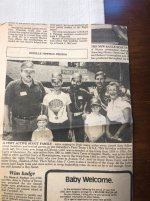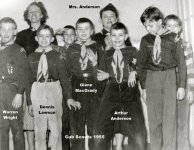I spent a very few short years in scouts as a kid, until my rural small town troop disbanded when the scoutmaster quit and no one else was willing to step up to the task.
Many years later when my son entered Cubs, my wife volunteered as den mother. When my son advanced to Boy Scouts I became an assistant scoutmaster and my wife was troop committee chair for a few years.
Some time after that, a friend at work who was deeply involved in BSA wilderness training and winter activities for scouts asked me to assist with the Council high adventure training program. Soon after he asked me to attend the Adirondack trek leader wilderness guide training program he chaired at BSA National Camping School in the Adirondacks. From that experience, the next year I was asked to join the training staff for that program. We went on to actually write the high adventure wilderness training procedure document that became the written BSA high adventure training standard, as modified for the characteristics in each region of the country.
For the next 30 years I was one of the permanent annual staff instructors, specializing in teaching canoeing, land navigation, and camp food. Our students, typically of college age, but with a few older guys thrown in. Once successfully certified during the 8 days of combination classroom and Adirondack field exercise training, they could be hired to work at one of the regions resident summer camps, leading scouts and their adult leaders on week-long canoe and/or backpacking trips into the Adirondack wilderness.
From their training experience, many essliy go on to pass the exam to become NYS licensed wilderness guides. in fact, a long time past president of the NYS Guides Association was also a long time active adult sccouter, and the state asked him to write the state licensed guide's written exam. At least 90% of the exam general outdoor skills questions are thus taken directly from the official BSA Field Guide book (different from the BSA handbook).
We instructors had a fairly strict criteria for students to graduate from the program, and not everyone always passed. If not, then no summer job with BSA for them leading treks. In most years one, two, or more might or might not be offered a different low level less high-profile job at scout camp. Amongst the senior program staff, our personal guideline for student certification was simple: "Would I trust this person to lead my own child safely into the wilderness and have them return smiling, having had a good positive time?". If the answer to that was not easily in the positive, then they fail the program training. It was an easy thing to observe and could in most cases be easily justified by documenting each student's ability to demonstrate a good and safe trustworthy performance.
My wife was hired to become the office manager at one of the resident camps not far from our home for six summers. I would help out when I could and I guided a few of those week-long treks when we were shorthanded of younger trek leaders and too many troops wanted to go on trek that week. We had the best time when a troop wanted to paddle the Lows Lake - Oswegatchie traverse. Lots of paddling, navigation exercises, and a 3-mile portage. I had troops return the following year and they requested me to guide them again on that route. Unfortunately, that BSA camp, among several others, is now closed.
My son and his best buddy both achieved Eagle at the same time and had a common pin on ceremony. My son went on to graduate from the Air Force Academy and his friend went to West Point, and they are still best friends, visiting each other often. My son retired as a Lt Col fighter instructor pilot and he now pilots commercial airliners. His friend is now an army general and still refers to my wife as "Den Mom". I believe the dedication and commitment to complete their "trail to Eagle" was key to their life successes.



